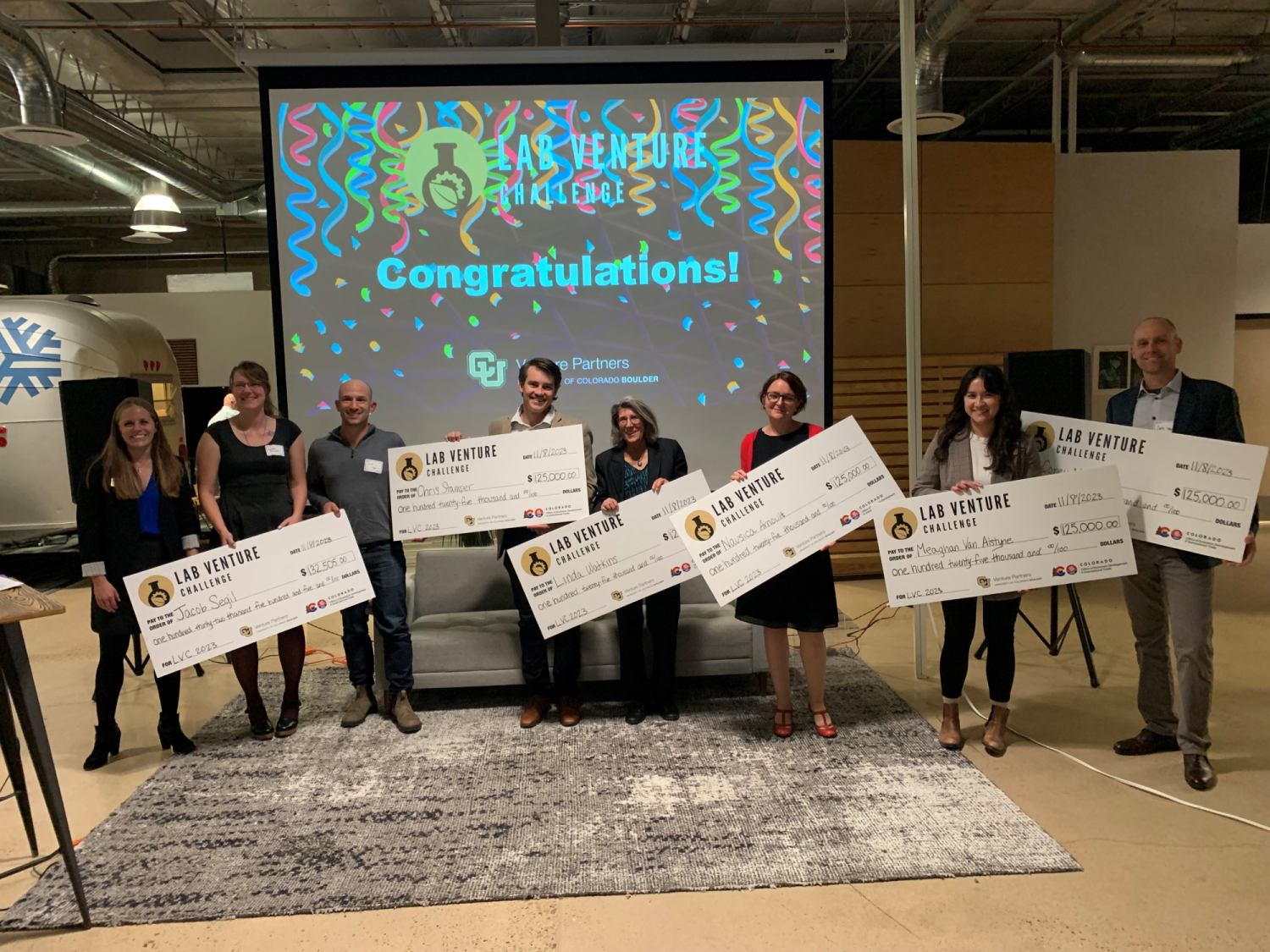State and university partner to award over $1.5 million in funding to University of Colorado innovations

Sixteen teams of University of Colorado faculty, researchers and graduate student innovators competed for a combined $1.5 million in startup funding grants in this year’s Lab Venture Challenge (LVC). Judges from CU Boulder’s entrepreneurial network heard Shark-Tank-style pitches across two nights, one for innovations in biosciences and another for physical sciences and engineering.
Through LVC, top innovators from CU Boulder, Denver and Colorado Springs compete for grants of up to $125,000. LVC supports projects that address a commercial need, have a clear path to a compelling market and have strong scientific support. The LVC grants are funded by the Colorado Office of Economic Development and International Trade (OEDIT) Advanced Industries Program, as well as Venture Partners at CU Boulder and the Chancellor’s Innovation Fund. Additional funding from OEDIT this year allowed each night’s top competitor to receive an additional $7,505 to fund their project further. Twelve awards were granted this year for a total of $1,515,010.
This culminating event for these groundbreaking teams showcased the university’s initiative to support innovators from discovery to economic success. LVC is run by Venture Partners at CU Boulder, the university’s commercialization arm and central resource for researchers who wish to translate their work into impactful business and social ventures. As part of the LVC program, all the competitors worked with Venture Partners to protect their innovations and practice their funding pitches for business audiences. LVC awardees will continue to work and collaborate with Venture Partners on their path to commercialization.
“This was our most competitive year yet,” said Amy Dodenhoff, director of LVC. “Over 40 teams applied, and we are so proud of all the teams, finalists and winners. LVC really shows how Colorado and CU are on the cutting edge of innovation, and it was great to see the community show up for our most well-attended showcases ever.”
Most competitors this year participated in Starting Blocks Customer Discovery Workshops and the Research-to-Market (R2M) Customer Discovery Program, presented by Venture Partners’ I-CorpsTM Hub: West—one of only five National Science Foundation Innovation Corps Hubs. I-CorpsTM helps innovators take their work from the laboratory to the marketplace through customer exploration and market research.
The Colorado economy was a recurring theme as competitors pitched their plans to grow their ventures—and to attract and foster new talent—right here in Colorado as they strive to serve and even disrupt global industries.
To date, LVC has funded over 107 projects through 54 new deep-tech startup companies; collectively, these companies have raised over $349 million in follow-on financing.
Applications for the next LVC will open in July 2024.
This year’s LVC was additionally made possible by Berg Hill Greenleaf Ruscitti LLP, Wilson Sonsini, and Sweater.
2023 LVC Winners
Biosciences
$132,505
- TorDan (previously MDS II) is developing a rotational nail system as an improved technique to correct rotational alignment for femoral surgery. Team: Jacob Segil (Paul M. Rady Mechanical Engineering) and Omer Mei-Dan (Orthopedics, CU Anschutz Medical Campus).
$125,000
- Mycobacteria Therapeutics is working toward a new treatment for stress resilience and mental health with oral supplements of beneficial mycobacteria. Team: Christopher Lowry (Integrative Physiology), Adam Bohr and Chris Stamper (both, MycobacteriaTherapeutics).
- ImmunoLogic is developing first-of-their-kind, site-specific therapeutics for Amyotrophic Lateral Sclerosis (ALS). Team: Linda Watkins and Suzanne Fulgham (both Psychology and Neuroscience), Peter Grace (MD Anderson Cancer Center, ImmunoLogic), John Forsayeth and Raymond Chavez (both ImmunoLogic).
- Nausica Arnoult (Molecular, Cellular & Developmental Biology) presented a new approach to treating HR-deficient cancer with targeted APE2 inhibitors. Her team also included Xiang Wang (Chemistry and Kerri Ball (MCDB).
- Meaghan Van Alstyne (Biochemistry) is working on a new treatment for dementia with peptide therapeutics targeting tau aggregation. Her team also included Roy Parker (BioFrontiers, Biochemistry) and Charles Hoeffer (Integrative Physiology).
- Corey Neu (Paul M. Rady Mechanical Engineering) has developed a device for improved magnetic resonance imaging (MRI) of cartilage structure and mechanical function, allowing for the early detection of arthritis and cartilage repair.
Physical Sciences
$132,505
- Mana Battery is developing sodium-ion batteries that are cheaper and safer than standard lithium-ion ones. Team: Chunmei Ban, Nick Singstock and Tyler Evans (all Paul M. Rady Mechanical Engineering).
$125,000
- Mesa Quantum is commercializing more accurate chip-scale atomic clocks, targeting initial use in monitoring devices on the ocean floor. Team: Sristy Agrawal (NIST), Svenja Knappe (Paul M. Rady Mechanical Engineering) and Juniper Pollock (NIST).
- Mach Electric Aerospace is fabricating carbon fibers from reclaimed carbon dioxide emissions using new energy-efficient and eco-friendly methods. Team: Spencer Dansereau (Ann and H.J. Smead Aerospace Engineering Sciences) and Wesley Whitaker (College of Engineering and Applied Science) with Francisco López Jiménez (Ann and H.J. Smead Aerospace Engineering Sciences).
- Green Steel Environmental will soon provide new products that sustainably improve wastewater treatment and biogas production. Team: Jon Teaford (Embark Entrepreneur in Residence) Jon Jonis, Mark Hernandez (all Civil, Environmental and Architectural Engineering).
- ZeroGap Energy is developing thermovoltaic cells with molten salt for high-efficiency thermal energy conversion to support energy storage essential to the green energy transition. Team: Longji Cui and Mohammad Habibi (both Paul M. Rady Mechanical Engineering).
- ReviewerZero.ai is working with publishers to deploy an artificial intelligence technology suite to ensure research integrity in scientific publications. Team: Daniel Acuña (Computer Science).
The Newsroom
For marketing and communication inquiries or news tips, contact Daniel Leonard, senior marketing and communications specialist for Venture Partners at CU Boulder.
For media inquiries, please visit colorado.edu/news/formedia.


